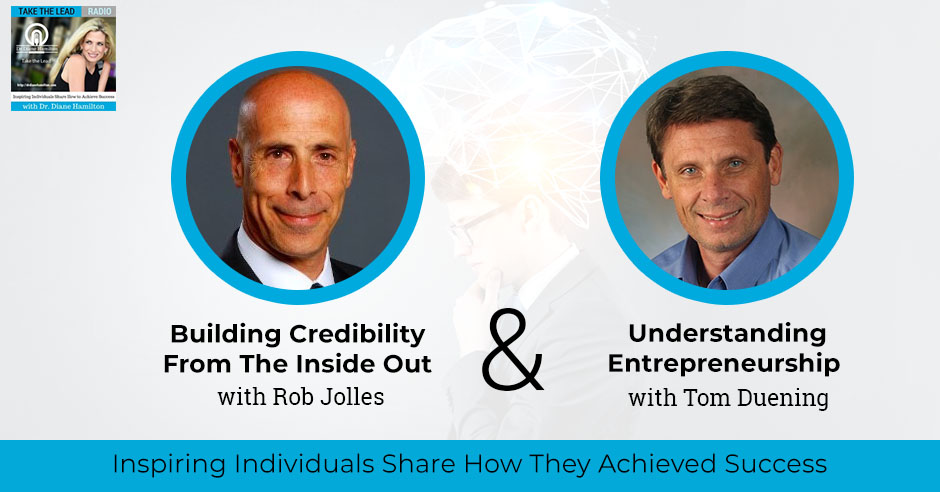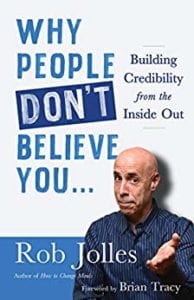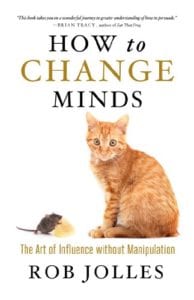
I’m glad you joined us because we have Rob Jolles and Tom Duening here. Rob is the President of Jolles Associates. He’s a bestselling author and sales expert. Tom is the El Pomar Chair for Business and Entrepreneurship at the University of Colorado. We’re going to be talking sales, entrepreneurship, and a lot more.
Listen to the podcast here
Building Credibility From The Inside Out with Rob Jolles

I am here with Rob Jolles, who is a sought-after speaker who teaches, entertains, and inspires audiences. He has the latest release of Why People Don’t Believe You: Building Credibility from the Inside Out. It’s nice to have here, Rob.
I’m thrilled to be here. Thanks for having me.
Thanks for being spontaneous. This was changed at the last minute for you and I appreciate that. I was fascinated by watching some of your videos. You have a lot of spunk and enthusiasm. I love that in a guest. I was looking forward to this. I watched your video on your site. I liked something that you said because I’ve been researching curiosity. I have created an instrument to measure what keeps people from being curious. You said, “If you can measure it, you can fix it.” That’s an important thing for people to understand. What are you measuring when you’re talking about that? When you’re working with people?
If I’m going to quote me completely, I’ll quote me this way. It all starts with a process and a process to me, and this is the Xerox in me. I’m fun at parties on the weekends, but during the week when I’m working with a client, I can motivate. I can inspire. I could entertain. Quite frankly, that’s the easy part. What most businesses, what most companies people are looking for is something that’s a little bit more repeatable and predictable. We all go searching for processes. That’s where the measurement comes from. Once you have a process, a way that’s repeatable of things that you’re doing, then you can measure it. Once you can measure it, you can fix it. A lot of times what happens is there are people who listen to tapes or read a book or go to a seminar and they’ll be all fired up. They don’t have a process. They feel a whole lot better or they walk out with that proverbial one or two good ideas. That’s a little hard to measure. That’s where it all falls apart.
You say when you’re giving talks, I saw you mentioned that they’re going to walk out with repeatable processes that they’ll be able to handle when they get out in the real world. That’s important when you have speakers. I agree with you. You feel pretty great sometimes. It’s fun. It’s more like going to a show. When you get home, nothing changes. People are thinking about making some changes and you deal with a lot of selling and persuasion in your five other books. I’m curious what you’re writing about in your book that’s different from what you’ve written about in your other books.
I feel like I’ve created the Jolles trilogy here. I went to Platinum and looked at their distribution. They will put books in boxes together. The three go this way. One is as a performer, as a salesman, New York life salesman, Xerox salesman, I learned how to sell. That was exciting and that was profitable. I had Simon & Schuster after me for a while saying, “When’s the next sales book?” I kept saying, “I haven’t changed my mind. We still have to ask questions and listen, I don’t know what you want me to do.” I thought, “The second part of this trilogy is not just what we say, but why are we saying it? Why are people nervous around salespeople? Why do people hate even the word selling?” Before we get into the process, maybe we need to have a conversation about that.

That’s where the book How to Change Minds came through. It’s more of the ethical impact of persuasion. To finish it off, this one I found myself for the past six years working with people who are beat up a little bit. They’re scarred. They’re in career transition. They’ve lost hope. You can show them what to say or why to say it, but it doesn’t come out right. It’s listening to somebody singing a song and they’re flat. The tune is off. They’d been defeated for so long. This third part, this new book is about, not necessarily what we say but how we say it. You always listen to your publishers so they pick a better title, but this will help you. The title that I wanted was, It’s Not the Words, It’s the Tune. That explains the book and the direction.
I’ve been in sales for decades. I’m thinking about all the stupid things I said as a salesperson. I liked it when you said, “We think we’re selling when we’re talking.” As a salesperson, especially when I was in my twenties, you want to get your message out and that’s all that’s on your mind sometimes. As you get older, you go, “That was dumb,” when you look back the things you said. You say words are overrated, but now since I’m a radio host, author, and speaker, how do I take that?
They’re overrated, but it doesn’t mean they’re not important. It’s that we’ve done is focused on the words. Why is it that you and I both flailed around in our twenties when we were learning to sell? It’s because all we were taught was the words. I was taught to live that quick story, The 100 Man Story. I always taught canned sales presentations. Nobody taught me to ask questions and listen. We have to remember it’s not exactly instinctive. Your words are important, but even as a radio host and as a speaker, I can write the words down for you. Take them, go up there and read them if you’d like. How’s that going to go for you? When you do a radio show and the conversation we’re having right now, sometimes we click more. When we finish, we go, “That felt good.” Was it that you found all the words or was it that you found the pitch and the pace? All the pieces around the words made them believable. I’ve finished by saying, “Please don’t think I don’t think words are important. I just think they’re a bit overrated. We need to focus on some other pieces of communication.”
You said an important word. You said believable. Why won’t people believe us? Why aren’t they believable?
When I wrote the book, I wanted to jump right at that. Here’s what we’re going to do to get people to believe us. The first section I went to was as I started working with people and I had my own petri dish. Every Tuesday night when I’m in town, I’m speaking in front of anywhere between 200 to 300 unemployed people. I have a real study of people. They learn their words, their résumés, and their elevator pitches and things like that and nobody teaches them how to say it. Why aren’t they believable? Because very simply they don’t believe themselves. When you lose that, no amount of coaching on pitch and pace and all the other things that we’re going to be talking about are going to be helpful. Step one is simple, you have to tell the truth. Meaning you’ve got to be able to look somebody in the eye and say, “I am a wonderful radio host.” If you don’t believe that, it’s going to come out a little bit off. It’s going to come out like somebody and go, “You’re off a tick. Can you pitch that up a little bit?” It starts with it. There are ways to address that, but that’s step one inside.
It’s hard for some people. Sometimes they go for self-deprecation to lighten the mood a little bit. I’m a horrible singer, for example, and I’m happy to admit that. It makes you a little more approachable if you would admit maybe some of your issues. Is part of telling the truth sometimes to admit what you don’t know?
[bctt tweet=”Learn to communicate better with people and create not just trust but urgency.” via=”no”]That strengthens your case. There’s a balance though. I’ve never told this story, but I went through a period of time where I was very good at what I was doing as a speaker. I was tearing it up on the road. All of a sudden, I noticed I’m not clicking with my audiences like I used to. What’s wrong with these audiences? It’s got to be the economy. Let’s blame a politician. Anything for ourselves. I flew out a former Xerox sales trainer. I said, “I need you in the back of the room. I need you to watch what’s going on because I am nailing these things and these audiences aren’t getting it.” What we realized is that I was getting so comfortable and good at what I was doing that I didn’t have any self-deprecation stories. I didn’t have a balance in the way I was delivering my message. It was, “I’m great. I do this. I’ve succeeded here. I win. I won.”
That’s hard to connect with. We balance it. When we’re getting beat up, sometimes we go a little overboard on the self-deprecation. Sometimes we sound more like a victim than somebody who’s balancing our communication. Once I started realizing that there are plenty of pockets of failure in my life that I can slide in, introduce, and make this more human and more authentic. I immediately started connecting not just with audiences but with people one-on-one. I’m all in favor of it, but let’s make sure we keep it in balance.
We don’t want to be Rodney Dangerfield. That was a pretty good impression.
I was a big fan.
I love Rodney. Isn’t he the best? He was. I absolutely adored him. I bought my brother one of those Rodney Dangerfield dolls for Christmas one time. It was the best thing I ever found.
I got to believe it’s not the most attractive looking doll.

He talks. It was great. It was his voice. A lot of what you write about is so important for everybody even if you’re not in sales. I’ve been talking to a lot of people lately who have gotten into taking improv classes to get better at speaking. How much of that have you done or what do you think about that?
It’s huge. That’s part of the study here of once we start rebuilding what’s inside of us, we’ll have to take it and start aiming it at people. Improv is absolutely critical. My daughter is an improv actress in New York. My son is a stand-up comedian in L.A. When those kids were growing up, we watched Whose Line Is It Anyway? We watched it seriously. When we drove to the beach, we weren’t counting license plates. We were passing objects and doing objects in a very crude way. After a while with a family of five, we could take an object and pass it around for an hour. We didn’t say, “It’s a stick.” We performed that stick. Improv is important. When you look at it, most of our life is improv. Most of the communications we have, even if what we’re doing right now, you may have a series of questions.
I have a series of responses that I’m fairly comfortable with. For us to click, we got to both come off script a little bit. Even if we don’t, we better feel like we’re coming off script. Improv is important. In the book, I go over some ideas and suggestions because in the end, that’s what usually makes us the most authentic. When people feel that that wasn’t what Rob Jolles must say every time he gives an interview. Rob went to an area and you could feel it because we’re reacting to something in the news now that felt real. We’re talking about why people don’t believe you. To shout at somebody and go, “You got to be real.” That’s nice to hear but how. Improv is a very important piece of it.
I had a lot of fun with it. I went on a course. I’ve never done it before. I’ve had so many people talk about it. I thought, “I always want to go see what it is.” It is fun. It was my show though. I don’t use preset questions and different things like that. A lot of people do that. It gets very boring because a lot of people don’t want to be put on the spot if they don’t know what to answer for the next thing or where to go if it goes down a rabbit hole they’re not expecting. That’s what makes these shows much more interesting. You’ve never told this story or you’ve never done it. When people do that you go, “This is great. I don’t want to hear the same interview that I’ve heard on 50 other shows.” It’s all good to do the, “Yes, and? Where do we go?
I’ll go a step further. I do a lot of interviews. Frequently, on panels, the guests will say, “Would you like to go over your questions?” I would say the same thing, “Absolutely not. I don’t want the questions.” I was on a panel with three other people. It was a podcast. They said, “We’re sending out the questions.” I said, “Don’t send them to me. I don’t want to see them.” It’s not going to make me any sharper. I’d rather take it where it lies and play it. Usually, we’re in an area of knowledge. Let’s go from there. It’s so much fresher and better. I love the fact that you come pretty fresh, so do I. I like it that way.
You’re dealing with a topic that could reach so many different people. It would be hard to focus it too narrowly. That makes me wonder, are you talking to salespeople or are you talking to everybody in the organization? Because you’re known as a bestselling author in sales-related areas. Who’s your audience?
[bctt tweet=”There should be Office Politics 101 in universities because that’s the bus people are going to be walking into.” via=”no”]The worst answer you could give as a writer, as an author is, it’s everybody. That means you’re not branded. I’m going to avoid everybody but let me come around the side door and say it this way. If you look at the books that I’ve written, I came out of the gate as and have been years on the road, 2.5 million miles in the air. I typically speak to sales teams for the first twenty years. Like anyone else, I’m evolving. As I see the finish line of my career, I’ve always wanted to look people in the eye who say, “I don’t sell. I don’t like to sell.” I’m looking at a nurse, I’m looking at a doctor, I’m looking into a lawyer, and I’m looking at people, “You have to be able to sell. You probably do. You don’t even know it.” I’ve wanted to have a conversation with them.
This book and the previous book is not for everybody. In a sense, this book, my sales core is loving it. That’s fine. I have written it for people who look in the mirror and go, “I don’t want to sell.” That’s going to hold you back as a manager. If you can’t take that idea and make it feel like it’s the team’s idea, you’re not going to be successful as a manager. I got news for you. We call that selling. There’s a part of me that’s wanted to dedicate the remainder of my career, not just to my core audience, but to those who say they don’t sell, I say they do. We all know they do. I’m trying to write to that.
It’s interesting because my husband’s a physician. Physicians are in sales. You don’t think of how many positions out there involve some selling. It’s something that people don’t want to face because it sounds like, “Eww, sales.”
It sounds like, “Eww,” but here I am not making the dietary changes you’ve asked we make year after year. I’m not cutting the salt out. I’m not doing all the things. I’m not exercising, not doing the things you said. You told me to do it. I believe it’s a moral responsibility for physician and everyone else to realize that if you want to be a good physician, then you need to persuade. We can call it influence, we can call it persuasion. I have other words that make people less nervous. I’m going to smile when you turn the other way and go, “Welcome to the world of selling.”
When you’re talking to people, if you’re a doctor or anybody else, you have to have someone who is open to change to some extent. How do you tell if somebody is open to change?
The definition is a great question. That’s one I don’t typically get.

It’s giving you time to answer it.
Let’s do it one-on-one or one-on-many for a seminar, for a group of people. Frequently, they don’t know, but somebody wanted them there. That was the guy above them. The rest of them are sitting here going, “What in the world are we doing here?” I have certain exercises, things that I like to do, talking about style and very easy things. I can come in and have them go through role plays and things without talking about selling. Yet have them engage in a conversation that they’ll take on their smartphones. Before they play it back, get them to tell me all the things they don’t like about salespeople, have them play it back and let them hear. They’re basically doing everything they don’t like. Once you find value in a room, that didn’t earn me a day of talking, but now I got an hour. I earned a little something.
I showed them something they didn’t know, a blind spot, an unconscious incompetence. I’ve earned the right to go further. Before I talk about selling, I like to talk about the way people make decisions. A doctor, a lawyer, an accountant, they don’t have a problem with that. They don’t have a problem seeing where people get stuck, where they are decision points are. All I’m trying to do is create a framework around that. I go at it in a scientific and analytical way. That usually gets people to realize, “Although Toyota’s one of my biggest clients and I love them, I’m not teaching you to sell a car. I’m teaching you, communicate better with people and how to create not just trust but urgency. Tell me, doctor, lawyer, whoever, which part of that don’t you like?” It’s coming in easy and then earning the right to get deeper into the topic.
You mentioned Toyota, but you also have a lot of other big names that you’ve worked with Disney, GE, universities, and more than 50 financial institutions. What got you interested so much in the financial industry?
It was an easy first match. Welcome to the world of being an entrepreneur. I left Xerox 26 years ago now. Everybody has a dream of being an entrepreneur, but you need something called a client. One of the first clients that stepped up was a mutual fund company named Van Kampen Merritt, who changed her name multiple times since then. They utilized me as a consultant to work with banks and offer them instead of value-added support back in the ‘90s was, “I’ll give you a value, I’ll give you a Knicks ticket on the floor. There’s my gift to you.” People realized that’s not helping us so much. They were the first one who said, “We’re going to redefine value add. We’re going to bring in a third party. We’re going to teach you how to sell, but we’re not going to do it. We’re going to bring in somebody for you. That’s how we’re going to add value to this relationship.”
It was magical. It introduced me to a lot of banks. It also put Van Kampen on the map and created a very strong following. Value-add and if you look at major corporations, most of them now offer something to their clients to help them and assist them as a way of adding value because a mutual fund is a mutual fund, a stock is a stock. Is that what you’re selling or you’re trying to make me more successful? That helped me and that introduced me to the financial industry and the rest is history.
[bctt tweet=”Entrepreneurship is always a team sport. It’s a very social enterprise.” via=”no”]I’ve worked in sales in different industries, banking, one of the pharmaceuticals. They’re all so different. There are some things that are basically the same. Part of your book, it looked like you were almost getting into office politics a little bit. Do you see any differences in the industries in terms of office politics or is it everywhere?
I can only speak of where I’ve been and that may be above my grade level. I will tell you from my experience, it is what it is. It’s pretty much everywhere. Bigger corporations have a little bit more going on. I was glad that Berrett-Koehler got the message there because they were scratching their head going, “Why people don’t believe you is office politics.” I reframe that as sustaining your believability. I did that because when I started piloting programs, two-day courses, the minimum requirement to get in which you have to be unemployed for at least three years. Most of them were five. We returned. People were getting hired because we were teaching them the tune. What I noticed was three months later, they started popping back into the room again. What I began to realize was we got them believable, but they still don’t know how to disagree with the boss.
They still don’t know how to fit in with the team. They still don’t know what consensus is. These are pieces that are plaguing them. They’re going to be thrown right back out again. I thought to complete this story, it’s not just how to believe in ourselves, it’s not just how to get other people to believe in us. It’s how to sustain it. I wished the universities would pick up on this and realize that they have an obligation to not only get rid of that stupid word, soft skills and call it performance skills or something else. To understand that like English 101, at least that’s what I took at the University of Maryland. There should be office politics 101 in those universities because that’s the buzz all these people are going to be walking into.
Whatever you want to call it, people are definitely having problems with behavioral issues. That’s what I write about in my books. I know you’ve had so many books. This is your sixth. I am curious, is this a part of another series?
The trilogy is complete. I mentor a lot of authors. As a fellow author, a lot of times you don’t go looking for a book, it finds you. My eyes are always open. I write up every other week what’s called a BLArticle where I get into some topic. I would say 25% of them are sales. A lot of them are dealing with certain things. I’m going to go where I need to go. Everyone asks, “Is that your last book?” It could be. Who knows? Somehow it always feels like it when you have written it. You can’t push it. You can’t go, “I’m going to write about the squirrels.” You’re going to be married to squirrels for the next couple of years. Make sure you love that squirrel.
If somebody wants to read Why People Don’t Believe You: Building Credibility from the Inside Out or find out more about you, how could they reach you?
It’s pretty easy. I am Jolles.com. That’s where the world opens up to you if you want to know about Rob Jolles. I have something called a BLArticle, which you can sign up for. It’s every two weeks I’m going to celebrate my 10th anniversary. Every two weeks neurotically, I will write between 500 to 600 words and send it out. It’s something that’s been helpful to me as a writer. It requires a form of discipline as you can imagine, but very proud of it. You can learn about me and sign up for the BLArticle and all sorts of good things there.
Thank you, Rob. This was fascinating. I enjoyed having you on the show.
It was great. It made me tap dance a few times and that’s always good for me.
Understanding Entrepreneurship with Tom Duening
I am here with Thomas Duening, who is the El Pomar Chair of Business and Entrepreneurship and director of the Center for Entrepreneurship at the University of Colorado at Colorado Springs. He consults broadly with startups on a wide variety of issues and industries. He is a writer for many things. I saw you on Forbes. You’ve got an eTextbook published at Bridgepoint. I was the MBA Program Chair at the Forbes School of Business. I’ve seen your work at the universities at which I teach. It’s exciting to have you here, Tom.
It’s great to be here with you, Diane. Thank you very much.
I know that Tom Warda suggested I talk to you. He said that you were somewhat like him. You’re a very fun and very tenacious. He had a lot of good things to say about you. I’m looking forward to this.
Tom is a good friend of mine. He is a serial entrepreneur. If you look in the dictionary, they probably have his picture next to the term.
[bctt tweet=”Innovation isn’t a science. It’s not something that can be whittled down to a technique. ” via=”no”]It’s interesting to teach entrepreneurship and to even discuss it. I’ve had Marty Zwilling as a Forbes expert in my classes. I’ve used some videos. He’s a Forbes contributor as well. It’s fun to talk to you guys about all this stuff. There’s so much to entrepreneurship. A lot of people want to know the basics about why people fail so often. I was watching some of your talks that you gave. I saw a 2011 and one that was a little bit older. I saw some more things, but you basically said that people have to be a good fit personality-wise. Do you still stick with that?
I’ve been teaching this thing for many years. I’ve been an entrepreneur since I started my first business when I was in graduate school in 1984. I started my first business in Minneapolis. I’m still involved in a lot of different ventures. I’ve had everything from bankruptcies to big, nice exits and so on. The way I look at teaching this is I can’t stand in the classroom and teach anything that I haven’t personally experienced in entrepreneurship. Even though I’m a Chair Professor and I need to conduct the research I do a lot of writing around this. If I can’t make a match between what I’m talking about in my writing, research, my books, and experiences that I’ve had, then I simply can’t put it down into words. I feel like this is something you have to be ultimately responsible as an educator to nudge people into this very challenging career path. Most of the students that I have, I teach both undergrad and grad are first time entrepreneurs or seeking to become first time entrepreneurs. I take that responsibility. I find it to be something I have to think about deeply because it’s a hard path. It’s not for everybody.
What we have discovered over time is if you follow certain entrepreneurial virtues and as you conduct your life if you want to be a considered to be an entrepreneur, whether or not you have a venture going on at that given time, the central virtue is to create value for other people. You don’t think anymore in terms of, “What’s in this for me, am I getting my fair share?” Rather you use yourself, you use your skillsets, your experiences, and the people that you know, the resources that you control, and so on, to try to create value for the people in unique ways. If you get up every day and think about, “How do I create value for the people?” Eventually, you will tune yourself into some type of venture opportunity that it just appears. It’s not about looking around at the economy and finding gaps and that kind of thing. What’s more important is to find a match between your unique capabilities and the opportunities that are going to be there and that’s how things have worked for me over the last 35 years of being an entrepreneur.
You said in one of your talks that a lot of the problems come with either over or under-capitalization that people quit maybe like a week too soon and then someone else takes what they did and goes on. How do you know when to cut bait?
If you are an entrepreneur and you were practicing the virtues, sometimes you’ve got to not necessarily quit, but maybe you have to scale back. I’ll give you an example. I’ve got a buddy that I’ve started a new business with here in town. He’s already got some appointments set up. It’s a home improvement company. We’re getting that going here in Colorado. He called me. He was involved in this company. He felt like it was something that he couldn’t continue to pursue that. In fact, he had run into some problems with installation, crews that were damaging homes and leading to insurance claims and so on. I said, “Let’s go back. Let’s think about what’s happened here and let’s make sure that we’re going to fix these problems.” Basically, we’re rolling out the company now and all the problems have been fixed. What happens is sometimes the timing is not quite right for you to scale the value that you’re capable of creating or it’s not scaling fast enough. You may have to supplement your income by getting jobs, which I’ve done many times. I can’t tell you how many things I’ve worked and the weird jobs that I’ve taken nearly as placeholders until things start to turn around. They always do.

I know a lot of professors that teach part time going to do that thing. It’s a great extra way to supplement, but it’s very expensive. They always say you have to be a risk taker, but not everybody is or they say you have to have the ability to forecast and understand EBITDA or whatever, all the different things. Some people are not good at all that.
The thing about risk is I always get a big kick out of that because I’m probably the most risk-averse person that you want to be. If I could work from home all the time, I would. The thing is, my daughter is a rock climber. For me, I’m not going to go rock climbing. It’s too risky. The thing is she has done it often enough that she knows how to take the risk of doing that. It’s the same thing with entrepreneurship. When you do something new that you haven’t done before. It appears risky or when you do something that other people generally don’t want to do. It appears risky, but you can learn ways to take the risk out of deals and learn to take the risk out of entrepreneurship. One good way is to surround yourself with people who have done it and people who have experience. There’s no reason to go in alone. Entrepreneurship to me is always a team sport. It’s a very social enterprise. By surrounding yourself with people that maybe have more gray hair than you or more experienced than you or whatever it might be, one of the ways to reduce money.
It’s other people’s money. How do you handle that when things don’t go well?
There are ways. Anybody that’s invested in the company should be sophisticated enough to realize that sometimes they don’t work. I’ve had plenty of times where I’ve invested in things. I’ve lost my money. That’s the way it goes. If you’re a sophisticated investor, you know that you have to spread the money around a little bit and have different types of entities that you’re involved in at different time horizons and so on, different vintages. If you started a housing business in 2007, good luck. That didn’t work so well. The same housing business in 2016, 2017, you look like a genius. You’ve got to spread it around. Timing is a big part of it.
It’s interesting to see how much more entrepreneurial thinking that they’re allowing in workplaces. They weren’t even allowed. It’s a terrible word to use allow. They discouraged it in the past, in my experience. I see much more of them embracing it now. How do you hire somebody with those skills and not lose them to them wanting to create their own business?
You never worry about that. To me, when you hire somebody, basically, you want them to be extremely mobile because if they were extremely mobile, that means that they’re very good at what they do. You build incentive packages and so on around them to ensure that even though they’re highly mobile, they’ll find that you have created a tremendous work-environment, work-platform for them to be successful. We wrote a book about that years ago. A partner and I came out of eLearning company that unfortunately didn’t work out. We got caught up in the Dotcom bust. We were managing about 40 highly talented engineers that were part of our technical team. We wrote a book called Managing Einsteins about how do you keep these very valuable, intelligent, innovative and creative people motivated to stay with you because they have what we call divided loyalties. The first loyalty of anybody that’s good at what they do is to their profession. They’re like, “I’m going to practice. I’m good at this. I’m going to practice this.” The second loyalty is to the organization. Once you realize that people have these divided loyalties, you can work with that. If you don’t realize that, if you think that, you got to be loyal to the company above all things, then you’re missing what matters to people of high intelligence, high creativity, and high productivity.
[bctt tweet=”In a world full of fake news, intellectual character is an extremely valuable educational background to have in the modern world.” via=”no”]We saw a lot more of that in the past generations than we’re seeing now with Millennials and the Z Generation. It’s a whole different time. There are not the twenty-year timeframes of staying with companies and all the things that we used to do. I even get a pension. I don’t think anybody I know gets a pension. You don’t hear about that anymore. People are job hopping more than ever and organizations look at it so differently now. It used to be you burned your bridge, you’re gone. Now you could come back. If you failed, it used to be so bad. Now it’s a learning experience. What do you think are the biggest things that you’ve seen changes in terms of having more of an open mindset for this entrepreneurial thinking?
If you look at around the world, there are a lot of studies about how innovation is the term that CEOs think is the thing that they think they need the most. Yet none of them have been instructed, taught or brought up through the system in a manner that enables that. I’m an editor for a journal called the International Journal of Innovation Science. It’s almost funny when you think about it because innovation isn’t a science. It’s not something that can be whittled down to a technique. Yet this journal that I’m part of and I wrote an article for them called The Illusion of Technique. Hopefully, we’ll begin to change some of the types of articles that we received, but in organizations, there is a term for that. It’s called entrepreneurship.
What that means is people are entrepreneurial inside the organization and company say that they want entrepreneurs and so on, but they haven’t figured out how do judge the performance of somebody that has that capacity inside the organization if they don’t have P&L responsibility or if they’re not measured by the amount of time or some other productive widget. It’s very hard for them to determine whether or not this person is worthy of their salary and so on. Companies have done things. Google has something called Tinker Time where people get a chance to spend 20% of their time or whatever doing whatever project they want. It’s led to some interesting innovations. The intent is that ultimately something commercializable was going to come out of their efforts. At the same time, there’s a way to create a culture of innovation. It’s not something that you can stand behind somebody and say, “Innovate, I demand you to innovate.” You can’t do that. You have to create this culture that beacons it and enables it to show itself rather than something that you can command or measure constantly.
It can’t be done. I look at leaders like Bezos. He’s tremendous in terms of what they’ve done with Amazon and the different types of businesses that they become. He drives the company by saying, “Look at Amazon. Every day is day one. We want to be the kind of a company where we never lose that entrepreneurial spirit. Certainly, we want to be good in our operations and effective and efficient and all that. At the same time, we want to constantly be looking over the horizon to see what kinds of businesses we might create for the future.” Most big companies lose that sense startup, that excitement of the startup phase of a company. In fact, many are led by people who have never been in a startup. You don’t know what that’s like to have experienced that chaotic, fast-paced, almost constant crisis management time. That’s my favorite part of a business is the startup phase. That’s so exciting.
It’s good to recognize what you’re good at and that you’re talking about some of the things that I wrote about when I was researching curiosity because everybody thinks they want to be innovative. You have so much that is influenced by drive and motivation. To me, it kept coming back to what is the spark to all of that? What gets you motivated? A lot of it is curiosity. I don’t think people feel very comfortable asking questions sometimes or providing solutions if they’ve been shut down in the past or if their culture at home or at school or wherever did not influence that type of thinking. What I’m trying to do is make sure that people recognize the things that hold them back from being curious. You sound like you’ve always been a curious person. What do you think led to your curiosity?
I don’t know. Maybe because I’m so paranoid and I kept on trying to figure things out and try to understand things. It’s funny. Curiosity did lead me in a lot of weird directions. Curiosity can be a tremendous virtue to be able to practice that. You take a look at my career, for example, here I am a Chair Professor of Business and Entrepreneurship at the University of Colorado in Colorado Springs. I’ve never taken a business course in my life. I’ve never been in a business class. I’ve written seventeen books on business and entrepreneurship and so on. My undergraduate was in physics and chemistry. I did a Philosophy of Science, a Master’s degree, and then I did a PhD in Higher Ed Administration.

I thought I wanted to be a college president someday. I enjoy the campus environment, but it never came to pass. I don’t have the temperament to be a university president. I’m very entrepreneurial. The point is all this curiosity leads you into directions in life that don’t necessarily have a clear path. You create your own little work of art, whatever that is, which amounts to your life. It can’t be emulated basically. Nobody could reproduce what it is, the various experiences that you’ve had, because you’re constantly looking around to see how it is that you can apply yourself in new ways. Curiosity isn’t just about learning a new language or something, but rather what do you do with that?
The whole thing about curiosity has to be linked to some practical application. It becomes something that people can embrace and recognize that in fact, you can practice becoming better at questioning, asking and exploring the different offerings of the world. I’ll make one more quick reference that might be interesting to some of your readers. There’s a whole new movement going on in philosophy. It’s called intellectual virtues. Intellectual virtues now are replacing what used to be called the theory of knowledge. All these, from Eckart to Kant. Everybody is like, “How do we know what we know?” Finally, philosophers are giving up on that whole thing and saying, “It’s a matter of how you comport yourself in the world.”
One of the intellectual virtues that they’re doing empirical research on this now, is curiosity. It’s now regarded to be a very important part of once what they called their intellectual character. One more quick illusion, there is now an academy, a charter school, that’s been built around the intellectual virtues and intellectual character included curiosity. It’s called the Intellectual Virtues Academy. It’s based in Long Beach, California. It’s chugging along and raising students that rather than be critical thinkers will be these people who develop their intellectual character. If you can imagine in a world full of fake news and incredible amounts of information, that’s going to be an extremely valuable, educational background to have in the modern world.
I agree with you with the importance of it. When we’re teaching business courses, we’re always talking about the importance of critical thinking and some of the things you’re talking about here. I couldn’t agree more. I serve on a board for a leadership academy, which is for K through 12 developing the type of soft skills and things that you’re talking about. I wrote my dissertation on emotional intelligence. All this is right up my alley of what I’m interested in. When I was studying curiosity, I was looking at trait curiosity as compared to state curiosity and specific curiosity, which is more about acquiring knowledge, being goal oriented, and problem-focused like what you’re saying. All that ties into solving the problems that we’re trying to solve. We can have diversive curiosity, which is more motivated by boredom where you go aimless and you’re not productive. What you’re talking about is so important because we need to focus on this specific acquiring knowledge of training and in more detail in my opinion. I love that you brought that up. It’s important to check out some of this stuff.
This whole movement on intellectual virtues, I’ve been thinking about it for a long time. I’ve done some research in positive psychology as well. One of the research streams in positive psychology is on virtues, the virtues that are associated with human flourishing generally. I thought that that matches well with my experience in my own life. I’d never say, “I want to be a Chair Professor in business.” I never said that. I kept on plugging away with this notion that I don’t want to waste my life and pretty much that’s the only thing that drove me. I love people. I love working with people and being a part of teams and things like that. I get a big kick out of that. All my life has been, “How can I help? What can I do?” That kind of thing. It takes you from one thing to another and here I am talking to you. How did that happen? It wasn’t planned.
That’s why I love doing the show because I’m a very curious person. I get to meet great people like you. I had Daniel Goleman on. John Kotter was on the show. You look at these people. You read all their books. You go, “This is fascinating.” You get to talk to them and find out what’s behind all the work they do. I like to see people be more interested in exploring more areas. That’s the true entrepreneurial mind. There are some people that have it and hold onto it. Others have it beaten out of them somehow.
[bctt tweet=”We are in an accelerating pace of knowledge creation and knowledge diffusion.” via=”no”]We’re all born curious. You have nothing in your head and maybe some basic skills and things. Within the environment that you’re being raised, you’re exploring. Children explore everything. They’re almost the state of nature. We put you into these school systems. I did okay in school when I was younger. I got bored with the whole thing. Sometimes I simply dropped out. I remember times where I was like, “What am I doing here?” I see a lot of entrepreneurs. They don’t finish out their schooling. They move on. We’re doing something wrong. We’re doing things right. Education needs to evolve. It’s still based on some misguided assumptions about what the brain is and about how people learn. Hopefully, we’re going to be able to cut through some of that crust over the next 100 years or so. We’re going to understand human beings in more detail. Like Goleman with his understanding of emotional intelligence and things, that’s a big part of the understanding of what we are as well, not just the cognitive piece. The emotional piece is a big part of some of the changes that will come along as we understand more and more some of these drivers of the human animal. How it is that we adapt to our world? The better we understand that, the better we’re going to be able to design environments in school systems and so on that nurture, everybody’s unique capacities.
The only thing I worry about with some of the ways that they’re going in the future is that they might leave out some of the glue that holds it all together. If you start to pick and choose what you want to learn that you may not know how much the humanities or other issues help you develop soft skills if you started picking topics. It’s complicated.
We go through that. Hirsch wrote a book about the different illiteracies that we have, innumeracy and different things that culturally we need to be aware of. There’s enough agreement that we have across all the different groups in this country that there are some fundamental things about history and so on that, we should all share and maybe some civic characters so we don’t go around standing at each other’s toes and elevators and things like that. Those are things that we all have to adapt to and conform to. Beyond that, you’re right. There’s a world full of exploration of the human animal and the human situation generally. We are in an accelerating pace of knowledge creation and knowledge diffusion. I’m 62 years old now and I think back on what the world was like back in the ‘50s when I was a kid. I’m like, “Who knew that we’d have this tremendous Bluetooth internet-enabled an environment that we live in?” It’s like the Jetsons. It’s tremendous.
I’m a Boomer as well. You think back and the Jetsons was the coolest thing and Star Trek. We’re past lip balms. We’ve passed them. It is all very exciting. I could see why entrepreneurship would be such a great topic to teach because you have that exploring personality. I’m glad to hear that you’re one of those who are guiding our youth in that direction because that we could use some great teachers. A lot of people will be interested to know how they can find out more about you and your books and everything that you’ve done. Can you share a link or how they could follow you?
I do have a blog called Philosophy of Flourishing. I’m a blogger as I should be, I suppose, but I do have my thoughts in there from time to time. All my books and things are available at my Amazon page. I’m the only Tom Duening in the world. There are other Duenings out there, but nobody yet has named their child Thomas. The Amazon page has got links to my blog and everything else. They’re very accommodating in integrating things. I’m also on LinkedIn and other kinds of places that you can certainly find out about me. I’m at the University of Colorado here in Colorado Springs. A simple Google search will find me there as well.
Tom, thank you so much. I’m glad that Tom Warda suggested you because this has been an interesting conversation. Thank you.
Thank you so much, Diane.
You’re welcome.
—
I’d like to thank Rob and Tom for joining me on the show. We get so many great guests. If you’re looking for more information about Cracking the Curiosity Code book or the Curiosity Code Index, they’re both available at CuriosityCode.com. I hope you join us for the next episode.
Important Links:
- Jolles Associates
- Why People Don’t Believe You: Building Credibility from the Inside Out
- How to Change Minds
- Jolles.com
- BLArticle
- Tom Warda – previous episode
- Marty Zwilling – previous episode
- Managing Einsteins
- The Illusion of Technique – article
- Intellectual Virtues Academy
- John Kotter – previous episode
- Philosophy of Flourishing
- Amazon – Tom Duening
- LinkedIn – Tom Duening
- University of Colorado – Tom Duening
- CuriosityCode.com
- Cracking the Curiosity Code
About Rob Jolles

Rob Jolles is a sought-after speaker who teaches, entertains, and inspires audiences worldwide. His live programs in and around the world have enabled him to amass a client list of Fortune 500 companies including Toyota, Disney, GE, a dozen universities, and over 50 financial institutions. He is the best-selling author of six books, including his latest release, Why People Don’t Believe You…Building Credibility from the Inside Out.
About Dr. Tom Duening
 Dr. Thomas Duening is the El Pomar Chair of Business & Entrepreneurship and Director of the Center for Entrepreneurship at the University of Colorado at Colorado Springs. He consults broadly with startups in a wide range of industries, written numerous journal articles, and published 15 books on topics including Entrepreneurial Method; Technology Entrepreneurship; and Introduction to Business, an etextbook published by Bridgepoint Education, the parent organization to the Forbes School of Business at Ashford University.
Dr. Thomas Duening is the El Pomar Chair of Business & Entrepreneurship and Director of the Center for Entrepreneurship at the University of Colorado at Colorado Springs. He consults broadly with startups in a wide range of industries, written numerous journal articles, and published 15 books on topics including Entrepreneurial Method; Technology Entrepreneurship; and Introduction to Business, an etextbook published by Bridgepoint Education, the parent organization to the Forbes School of Business at Ashford University.